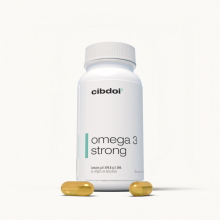Does Omega-3 Help With Joint Pain?
Published:
If you suffer from stiff, swollen, painful joints, finding effective relief is likely a top priority. With joint discomfort becoming increasingly common, many people look to natural remedies like omega-3 fatty acids for help. But can optimizing omega-3 intake really ease joint pain? Let's examine what the current research says.
Contents:
What Causes Joint Pain?
Before analyzing omega-3s, it's helpful to understand what leads to joint pain in the first place:

- Arthritis – Inflammation and damage to joint tissues from osteoarthritis, rheumatoid arthritis, and other types of arthritis. The most prevalent source of chronic joint pain.
- Injuries – Sprains, fractures, and dislocations from falls, accidents, sports, and overuse.
- Mechanical Issues – Misaligned joints, loose ligaments, worn cartilage cause gradually worsening joint pain.
- Infections – Bacterial or viral joint infections create swelling, stiffness, and pain.
- Chronic Pain Disorders – Widespread pain from fibromyalgia often includes joint aches.
- Medications – Some drugs list joint pain as a potential side effect.
Determining what's causing your particular joint pain helps guide appropriate treatment. Now let's look at whether omega-3s can help.
Omega-3s for Joint Health
Omega-3 fatty acids are essential fats with potent anti-inflammatory properties. The three main types are:
- EPA - Eicosapentaenoic acid
- DHA - Docosahexaenoic acid
- ALA - Alpha-linolenic acid
EPA and DHA come mostly from seafood. ALA comes from plant sources like flaxseeds and walnuts.
Omega-3s may benefit joints through several mechanisms:
1. Reducing Inflammation
Omega-3s lower joint inflammation by decreasing inflammatory compounds like cytokines and prostaglandins. This calms joint swelling and pain.
2. Improving Joint Lubrication
Omega-3s help maintain adequate synovial fluid to lubricate joints and prevent painful friction.
3. Supporting Overall Joint Health
Omega-3s provide building blocks for joint cartilage. They also increase blood flow to supply nutrients and remove waste from joints.
But what does the research reveal about omega-3s for joint pain relief? Let's review the evidence.
The Research on Omega-3s and Joints
Multiple studies demonstrate potential benefits of omega-3s for various types of joint pain:
Arthritis Research
A number of studies focus specifically on arthritic joint pain:
- A meta-analysis found omega-3s improved pain and stiffness in rheumatoid arthritis patients.
- Several trials show daily omega-3 supplementation provides modest pain relief for osteoarthritis sufferers.
- Some evidence suggests very high dose omega-3s allow rheumatoid arthritis patients to lower standard medications.
- Animal studies show omega-3s reduce arthritic joint damage and swelling.
Overall, omega-3s consistently demonstrate an arthritis joint pain-relieving effect.
Joint Injury and Surgery Studies
Research also indicates benefits of omega-3s for recovery after joint injuries and operations:
- Human trials find taking omega-3s after knee surgery reduces pain and improves function during rehab.
- Athletes with joint sprains recover faster with omega-3 supplementation versus placebo.
- Animal studies show omega-3s support cartilage repair after trauma.
By accelerating healing, omega-3s help restore normal joint function and comfort.
General Joint Pain Research
Even for nonspecific age-related joint aches, omega-3s appear helpful:
- Observational studies link higher omega-3 intake to lower risk of developing joint pain with aging.
- Several trials show omega-3 supplementation decreases overall joint pain in older adults.
This suggests omega-3s have protective effects on joints as we get older.
While more research is warranted, the current evidence indicates omega-3s may relieve various types of joint pain.
Omega-3 Supplements for Joint Discomfort
Given the research, getting more omega-3s may help ease joint discomfort. But what's the best source – foods or supplements? Here's a quick comparison:
Food Sources of Omega-3s
You can increase dietary omega-3s by eating more:
- Fatty fish – Salmon, mackerel, sardines, trout. Aim for 2-3 servings per week.
- Chia/flaxseeds – 2-3 tablespoons daily, ground.
- Walnuts – About 1 ounce (handful) per day.
- Fortified foods – Some yogurts, eggs, milks have added omega-3s.
However, experts typically recommend at least 500mg daily EPA/DHA for substantial joint benefits. It’s difficult to get enough from food alone.
Omega-3 Supplements
Supplements provide concentrated omega-3 doses:
- Fish oil – Provides EPA/DHA. Cod liver oil also contains vitamins A and D.
- Krill oil – Has EPA/DHA bound to phospholipids for better absorption.
- Algal oil – Vegan EPA/DHA extracted from algae.
Liquid capsules get absorbed quickly. Take with food to prevent stomach upset. Discuss appropriate supplements and dosages with your doctor.
Lifestyle Tips for Soothing Joints
While omega-3s may help joints, they work best combined with other natural approaches like:
- Gentle Exercise – Keeps joints flexible and lubricated.
- Weight Management – Losing excess weight reduces joint strain.
- Assistive Devices – Braces, tape, and sleeves support painful joints.
- Heat/Ice Therapy – Alternating hot and cold packs relieves joint pain.
- Stress Relief – Relaxation practices like yoga and meditation help ease joint tension.
Discuss comprehensive pain management with your healthcare providers. An integrative plan provides optimal joint pain relief.
Does Omega-3 Help With Joint Pain? Conclusion.
In summary, current research suggests omega-3 fatty acids may offer an effective nutritional approach for relieving joint pain and discomfort. Multiple studies demonstrate potential benefits of omega-3s for various types of joint pain including arthritis, injuries, surgery recovery, and general age-related joint aches.
Potential mechanisms include reducing inflammation, enhancing joint lubrication, and supporting overall joint health. While foods like fatty fish contain omega-3s naturally, supplements can provide therapeutic amounts more easily.
Always discuss omega-3 supplements with your doctor, especially if you take blood thinners or have bleeding disorders. Overall, optimizing omega-3 intake appears to be a safe, natural way to potentially find relief from annoying joint pain and stiffness.
Key Points on Omega-3s and Joints
- Omega-3s may ease joint inflammation and discomfort through several mechanisms.
- Multiple studies show omega-3s provide arthritis joint pain relief.
- Evidence suggests omega-3s support recovery after joint injuries and operations.
- Higher omega-3 intake is linked to lower risk of age-related joint pain.
- For joint benefits, target 500-1000mg daily EPA/DHA from food and/or supplements.
- Omega-3s work best paired with gentle exercise, weight management, and physical therapy.
- Increasing omega-3 intake holds promise for improving joint health and comfort.















